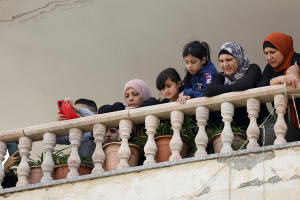West Bank a possible 'third front' for Israel
 Send a link to a friend
Send a link to a friend
 [October 20, 2023]
By Ali Sawafta and John Davison [October 20, 2023]
By Ali Sawafta and John Davison
RAMALLAH/JERUSALEM (Reuters) - Violence in the occupied West Bank has
surged since Israel began bombarding the Gaza Strip and clashing with
Hezbollah at the Lebanon border, fuelling concerns that the flashpoint
Palestinian territory could become a third front in a wider war.
Israel is waging war against the militant Hamas group in the Palestinian
enclave of Gaza, but Israeli soldiers and settlers pulled out of Gaza in
2005. Israel still occupies the West Bank, captured along with Gaza in a
1967 Middle East war.
Hamas, which controls Gaza, killed more than 1,400 people in a surprise
attack in Israel on Oct. 7, prompting an Israeli bombardment that has
killed 3,500 in Gaza. Israel is preparing a full-scale ground assault on
Gaza to destroy Hamas.
Western countries supporting Israel fear a wider war that would open up
Lebanon, with its Iran-backed group Hezbollah, as a second front and the
West Bank as what Israeli media call a potential third front.
Clashes between Israeli soldiers and settlers and Palestinians have
already turned deadly. More than 80 Palestinians have been killed in
West Bank violence since Oct. 7 and Israel has arrested more than 900
people. It conducted fresh overnight and dawn raids on Friday and
detained scores more.
Israeli forces raided and carried out an air strike in a Palestinian
refugee camp in the West Bank on Thursday, killing at least 12 people,
Palestinian officials said, and Israeli police said an officer was
killed during the raid.

The violence poses a challenge to both Israel and to the Palestinian
Authority (PA), the only Palestinian governing body recognised
internationally which is headquartered there.
The Israeli military said it was on high alert and bracing for attacks
including by Hamas militants in the West Bank.
Hamas was trying to "engulf Israel in a two- or three-front war",
including the Lebanese border and the West Bank, military spokesperson
Lieutenant Colonel Jonathan Conricus told Reuters. "The threat is
elevated," he said.
'GIVE PEOPLE WEAPONS. LET THEM CLASH'
In Ramallah, rare chants this week supporting the military wing of Hamas
- a rival of the PA's ruling Fatah party - showed a growing appetite for
armed resistance.
"Give people weapons. Let them clash. We'll show what we can do," said
Salah, a 20-year-old demonstrator who gave only his first name.
Fatah official Mowafaq Sehweel told Reuters: "We should let go of the
reins and use whatever means to fight occupation."
Others are less ready to fight.
Nizar Mughrabi, owner of an architecture firm, said he was disgusted by
Israel's assault on Gaza but not ready to pick up a gun.
"Netanyahu wants to fight, Haniyeh wants to fight - put them in the
desert with guns and let them shoot each other," he said, referring to
Israeli Prime Minister Benjamin Netanyahu and Hamas leader Ismail
Haniyeh.
Palestinian officials and Israeli analysts say a number of factors are
both helping to ignite tensions, but conversely also limiting their
scope, for now.
One is the hundreds of arrests Israel has made.
Hamas cited attacks on West Bank Palestinians and arrests this year as
part of its reason for attacking on Oct. 7.

But the arrests have also limited West Bank violence, said Salah al-Khawaja,
a 52-year-old anti-settlement activist.
"In Gaza, there's enough time (for Hamas) to organize militarily,"
he said. "Here, the occupation (Israel) can clamp down on a daily
basis. It leaves no space to build up military or political forces."
[to top of second column]
|

People react during the funeral of a Palestinian who was killed by
Israeli forces, near Ramallah in the Israeli-occupied West Bank
October 19, 2023. REUTERS/Mohammed Torokman

WEST BANK A COMPLEX PATCHWORK
While Hamas tightly controls besieged Gaza, the West Bank is a
complex patchwork of hillside cities, Israeli settlements and army
checkpoints that split Palestinian communities.
Israel occupied the territory in 1967 and has divided it into large
areas it controls, small areas where Palestinians have full control
and areas where Palestinians and Israeli forces divide civil and
security duties.
Between the seat of power in Ramallah and poorer peripheral areas,
there are multiple views on the benefits of violence.
Desperate young men in refugee camps are more willing to fight than
those in Ramallah where businessmen and senior Palestinian officials
stand to lose from a spiral of violence.
"My business is already suffering because of the unrest," Mughrabi
said.
Another key factor in stemming violence is Israel's security
agreement with 87-year-old President Mahmoud Abbas's PA.
Abbas condemned Israel's assault on Gaza while his security forces
cracked down on demonstrations. Fatah has not issued public calls
for armed resistance.
"The PA wants to keep peace and is worried that marches of thousands
of people could quickly turn into hundreds of thousands," said
Palestinian political analyst Hani al-Masri.
He added that PA officials do well financially and rely on
arrangements with Israel to get paid.
Should Abbas lose his grip or become ill in his old age, the
situation could deteriorate, he said.
'LONE WOLVES'
Lior Akerman, a former officer in Israel's internal security service
the Shin Bet, said fears over West Bank unrest predated the Hamas
war.
Hamas for years had been trying to "do all it can to activate
terrorists in the West Bank," he said.

Akerman acknowledged, however, that security measures had been
tightened since the Gaza bombardment began, saying that the most
recent round of arrests might not have happened under normal
circumstances.
"Last night the army ... took around 100 terrorists in the West
Bank. In regular days ... the Shin Bet would arrest only those they
knew were preparing terror attacks," he said.
One worry for Israel in the West Bank is "lone wolf" attacks from
among Palestinians who have disparate local loyalties but an overall
contempt for Israeli occupation, analysts say.
Recent surveys have shown overwhelming public support among
Palestinians for armed groups, including local militias that include
members from traditionally separate factions.
Even before the current Gaza crisis, the West Bank had seen a surge
in violence.
Israel stepped up military raids and a spate of Palestinian attacks
targeted Israelis. The 2023 Palestinian death toll until Oct. 7 was
over 220 and at least 29 people in Israel had been killed, according
to UN records.
(Reporting by Ali Sawafta in Ramallah, John Davison in Jerusalem;
Writing by John Davison; Editing by Howard Goller)
[© 2023 Thomson Reuters. All rights
reserved.]This material
may not be published, broadcast, rewritten or redistributed.
Thompson Reuters is solely responsible for this content. |